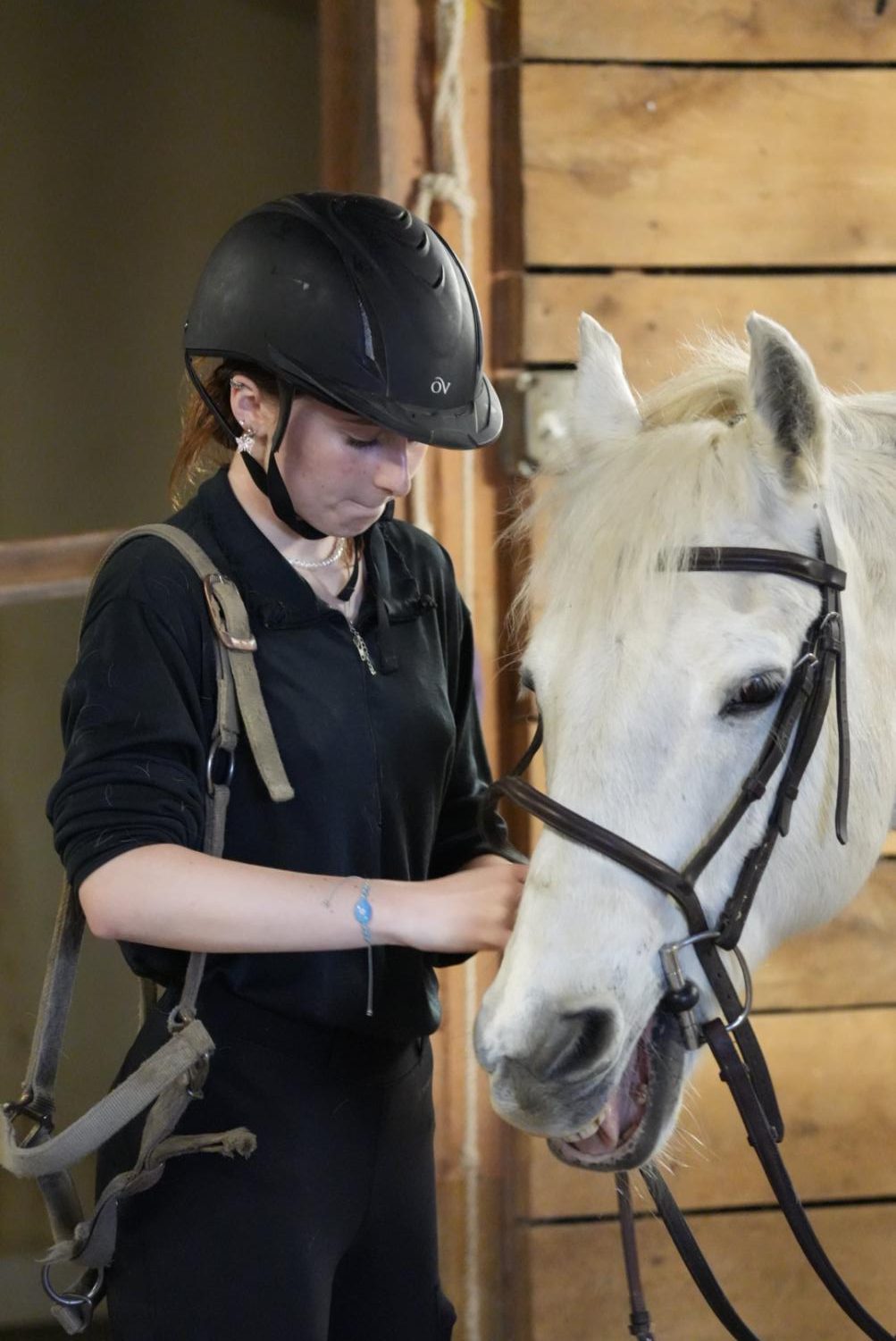The Kentucky Derby, an annual horse race that occurs on the first Saturday of May in Louisville, Ky. is upcoming, and while some fans at this school enjoy the racing, others said they watch to bet on winners.
Sage Moore, horseback rider and senior, said the Kentucky Derby, which first took place in 1875, is like a culture for some people.
“Not only do these events create jobs and support charities, but it also gives advertisement to the equine industry as a whole,” she
said, “People, especially in the Midwest, I think, are attracted because it’s just been something we’ve watched as we grow up.”
While Moore does not bet on horses, she said she still makes predictions within her family on winners. However, betting is still a popular activity within all sports.
According to the Woodford Reserve Kentucky Derby, before the first races of the Derby, Derby handicappers establish “betting
odds,” which are determined by how much money is wagered on each horse. For example, if a horse has a 4-to-1 shot, that would mean that 20% of the money after takeout was wagered on that horse.
Betting odds give viewers an idea of which horses are statistically favored in betting and can help guide them toward educated bets.
Even with the provided betting statistics, people like Moore said they just make predictions with friends for fun.
Sydney Lenski, horseback rider and senior, said she was not very familiar with the horses and the jockeys, so she just picked winners for fun based on appearance.
“I think it can be fun to bet on horses, as long as you’re okay with losing anything you put down and don’t take it too seriously,” she said.
All horse betting supports the horse racing industry and provides mass amounts of money. This money can go toward many different components of the business, both positive and negative.

Lenski, among other horseback riders, said she thinks horse betting is positive and ethical.
“The immense amount of money in the industry which is largely brought in by though betting and large racing events like the Triple Crown races, does ensure that the horses who are successful receive great care, which is arguably good from an ethical standpoint,” she said.
However, Lenski did say many horses that are bred for racing never even make it to the starting gate, and she is not the only one to shed light on this point.
Horseback riding coach Claire Fuller, also said that too many horses are bred just to race for a short time or not at all.
“The majority of race horses only have a racing career between the ages of 2 to 3 years old, so it is an industry that breeds an overabundance of horses,” she said. “It does not give horses the best chance for a long term career, as many thoroughbreds move
into other disciplines of riding or may even end up in a slaughterhouse.”

Moore also said that some corporations promote mistreatment of horses. She said the ethical considerations depend on what races are being bet on and who runs them.
“Some horse racing is extremely unethical and doesn’t take the proper steps to make sure the safety of everyone and all the animals is secure,” she said, “but I think some horse betting is ethical as long as you’ve done your research about the race and how those businesses or sponsors run the specific race.”
While some horse racing sponsors ensure proper safety precautions, the Kentucky Derby is one of the more controversial races. According to People for the Ethical Treatment of Animals (PETA), an organization focused on the ethical treatment of animals, last year’s winner, Medina Spirit, tested positive for an illegal drug. This is not the only occurrence of horses being given illegal drugs; however, there have been efforts to stop this.
“Doping horses for races is also a very controversial subject,’ Fuller said. “The (Horseracing Integrity and Safety Act) does a good job of regulating and banning individuals involved with the illegal drugging of horses for performance enhancement.”
In addition to concerns about drugging, Fuller said because horses’ prime performance is at such a young age, they are also more prone to injuries where parts of their bodies are not fully developed yet.
Even with controversial treatment of horses, the Kentucky Derby is a popular event, with around 150,000 attendees a year.
“Overall, I think (the Kentucky Derby) is an event that is just able to attract so many different types of people,” said Moore.
Fuller agreed and said there is good that comes out of the Derby with the people it brings together.
“It is an opportunity for friends and family to celebrate a historic sporting event,” she said, “It is also an opportunity for non-horse people to see a glimpse of the horse world in person or on television.”




























![Keep the New Gloves: Fighter Safety Is Non-Negotiable [opinion]](https://hilite.org/wp-content/uploads/2024/12/ufcglovescolumncover-1200x471.png)















































![Review: “Family By Choice” is the perfect watch that encapsulates family, love and everything in between [MUSE]](https://hilite.org/wp-content/uploads/2024/12/family-by-choice-1.png)
![Review: “A Phở Love Story” is an exceptional and authentic representation of teenage Vietnamese-Americans [MUSE]](https://hilite.org/wp-content/uploads/2024/12/a-pho-love-story-9781534441941_hr-786x1200.jpg)
![Review: “And the War Came” by Shakey Graves is the perfect year-round album [MUSE]](https://hilite.org/wp-content/uploads/2024/12/IMG_2665.jpeg)
![Review: "Abbott Elementary", a show I can watch with my family and truly enjoy [MUSE]](https://hilite.org/wp-content/uploads/2024/12/unnamed-1.png)
![Review: “We Live in Time” leaves you wanting more [MUSE]](https://hilite.org/wp-content/uploads/2024/12/IMG_6358.jpg)
![Review in Print: Maripaz Villar brings a delightfully unique style to the world of WEBTOON [MUSE]](https://hilite.org/wp-content/uploads/2023/12/maripazcover-1200x960.jpg)
![Review: “The Sword of Kaigen” is a masterpiece [MUSE]](https://hilite.org/wp-content/uploads/2023/11/Screenshot-2023-11-26-201051.png)
![Review: Gateron Oil Kings, great linear switches, okay price [MUSE]](https://hilite.org/wp-content/uploads/2023/11/Screenshot-2023-11-26-200553.png)
![Review: “A Haunting in Venice” is a significant improvement from other Agatha Christie adaptations [MUSE]](https://hilite.org/wp-content/uploads/2023/11/e7ee2938a6d422669771bce6d8088521.jpg)
![Review: A Thanksgiving story from elementary school, still just as interesting [MUSE]](https://hilite.org/wp-content/uploads/2023/11/Screenshot-2023-11-26-195514-987x1200.png)
![Review: "When I Fly Towards You", cute, uplifting youth drama [MUSE]](https://hilite.org/wp-content/uploads/2023/09/When-I-Fly-Towards-You-Chinese-drama.png)
![Postcards from Muse: Hawaii Travel Diary [MUSE]](https://hilite.org/wp-content/uploads/2023/09/My-project-1-1200x1200.jpg)
![Review: "Ladybug & Cat Noir: The Movie," departure from original show [MUSE]](https://hilite.org/wp-content/uploads/2023/09/Ladybug__Cat_Noir_-_The_Movie_poster.jpg)
![Review in Print: "Hidden Love" is the cute, uplifting drama everyone needs [MUSE]](https://hilite.org/wp-content/uploads/2023/09/hiddenlovecover-e1693597208225-1030x1200.png)
![Review in Print: "Heartstopper" is the heartwarming queer romance we all need [MUSE]](https://hilite.org/wp-content/uploads/2023/08/museheartstoppercover-1200x654.png)



